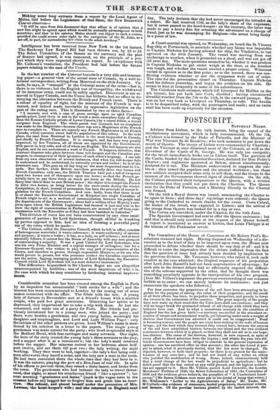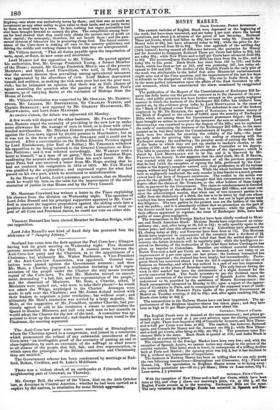The Committee of the House of Commons on Sir Robert
Peel's Re- solutions resumed last night. Having disposed on Wednesday of a dis- cussion as to the kind of duty to be imposed upon corn, the House now proceeded to debate whether there should be any duty at all : and it is difficult to resist the impression that the debate suffered from the fact that the question at issue had already been decided by implication in the previous division. Mr. VumEns, however, who raised it, took such comfort as the case admitted : the illogical sequence of his proposition after Lord John Russell's had not been unproductive of advantage; for each side in the former debate had so effectually exposed the difficul- ties of the scheme supported by the other, that he thought there was something peculiarly apposite in the interposition of his own proposal. [Into Mr. Villiers's argument the previous overcrowding of our columns forbids us to enter : we can merely indicate its tendencies ; and just enumerate the speakers who followed.]
For four centuries the proprietors of the soil have been attempting to le- gislate for the purpose of raining the value of their properties; and the result of all their efforts has been, to prejudice those properties, and greatly to lower the owners in the estimation of the country. The great majority of the people have now made up their mind that the Corn-laws shall not continue; and they will no longer brook the protracted refusal of all change with which they have hitherto been met. And to what a monstrous anomaly in the condition of England has the law given birth I—a territory unexcelled in the abundant re- sources of nature and accumulated wealth, yet labouring under such a weight of distress that Government has admitted it could not be exaggerated! Food is becoming scarcer, and the people are every hour sinking in the scale of human beings; yet the food which they demand they cannot have, because the owners of the soil have established barriers between our island and the two civilized continents between which it is placed, so that they shall not aid us in our hope- less distress. The cause of the distress, however, is now exposed, in spite of every effort to direct attention from the inquiry ; and within the year two dif- ferent Governments have been obliged to concede to the general expression of opinion : one has sacrificed office on that account ; the other has finind it pro- per to admit, what it previously denied, that the law must be changed. He objected, however, to both their projects: for there is no ground for the main- tenance of any corn-law ; and he had not heard of any writer on ethics who justified the modification of wrong. Some, indeed, conscientiously held that a total change of the law would be prejudicial to agriculture : but he defied proof that the fear rested on any valid ground, and the highest authori- ties are opposed to it. Here Mr. Villiers quoted Lord Grenville, the London Merchants Petition of 1820, the Select Committee of 1821, the Committee of 1836 and the evidence given beforeit, the pamphlet of "A Cumberland Land- owner," Eiir James Graham once more put in his denial of being that writer,) Mr. Whitmore's "Letter to the Agriculturists of Salop," Mr, Tooke, Mr. M'Culloch—the evidence of statesmen, landed proprietors, theoretical writers, . and farmers. Of the peculiar burdens pleaded by the landed interest, the
highway-rate alone was exclusively borne by them ; and that was as much an investment as any other outlay to give value to their lands, and as justly borne by them as local rates by a town. In fact, nothing but vague generalities had ever been brought forward to sustain the plea. The competition among farm- ere for land showed that they could only obtain the current rate of profit on their capital; the monopoly, therefore, did not benefit them : and the para- mount interest of labourers lies in procuring cheap food. The forced mainte- nance of the Corn-laws is making all men in the country politicians, and driving the middle and working classes to think that they are misrepresented.
Mr. Villiers moved, "That all duties payable upon the importation of oorn, meal, or flour, do now cease and determine."
Lord MAHON led the opposition to Mr. Villiers. He quoted against his authorities, first, Mr. George Frederick Young, a former Member of the House ; second, Mr. George Frederick Muntz, one of the present Members ; and third, Lord Fitzwilliam, who said, in March 1815, that the severe distress then prevailing among agricultural labourers HELS aggravated by the abundance of corn. Lord Mahon deprecated tumult and sedition, as making the rich man poor but not the poor man rich ; but he intimated an opinion that there was as little chance of again unsettling the question after the passing of Sir Robert Peel's measure, as of carrying Ballot or the exclusion of Bishops from the House of Lords.
Mr. Villiers's resolution was supported by Mr. Oswat.n, Mr. ELPHIN- STONE, Mr. LEADER, Mr. BROTHERTON, Sir CHARLES NAPIER, and Captain BERKELEY; and opposed by Mr. GILBERT HEATHCOTE, MT. MA1NWARING, and Lord JOHN MANNERS.
At twelve o'clock, the debate was adjourned till Monday.
A few words will dispose of the other business. Mr. FRANCIS THORN- HILL BARING urged the necessity of providing in the new law to make some allowance for the wastage of corn in bond, as is done with other bonded merchandise. Mr. MILNER GIBSON produced a " declaration " against the Corn-laws, signed by 20,000 persons in Manchester ; but as it was not in the form of a petition, the SPEAKER said it could not be received. After a conversation on the Belfast Election Petition signed by Lord Ennishowen, (the Earl of Belfast,) Mr. THESIGER withdrew his opposition to its being referred to the General Committee on Elec- tion Petitions ; and it was referred accordingly. Mr. WAKLEY read a letter to himself, "as a man of no party," from Lord President Hope, confirming the account already quoted from his son's letter. Sir Ro- BERT PEEL had also received a letter from Mr. Hope, stating that he had not tendered his resignation in 1834 or 1835. Mr. Fox Matrix was gratified by the explanation ; and expressed regret for what had passed on his own part, which he attributed to misinformation.
In the House of Lords, Lord CAMPBELL gave notice, that on Monday week he would lay bills on the table for the improvement of the admi- nistration of justice in that House and by the Privy Council.



























 Previous page
Previous page